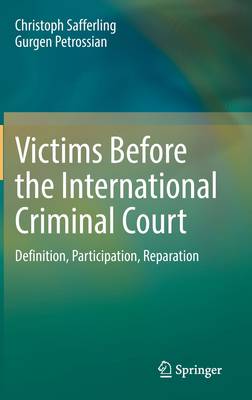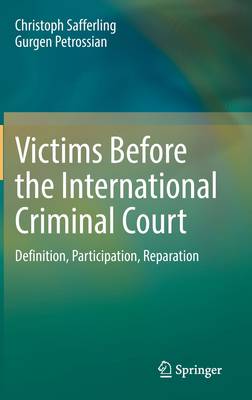
- Afhalen na 1 uur in een winkel met voorraad
- Gratis thuislevering in België vanaf € 30
- Ruim aanbod met 7 miljoen producten
- Afhalen na 1 uur in een winkel met voorraad
- Gratis thuislevering in België vanaf € 30
- Ruim aanbod met 7 miljoen producten
Zoeken
Victims Before the International Criminal Court
Definition, Participation, Reparation
Christoph Safferling, Gurgen Petrossian
Hardcover | Engels
€ 158,45
+ 316 punten
Uitvoering
Omschrijving
The book analyses the difficulties the International Criminal Court faces with the definition of those persons who are eligible for participating in the proceedings. Establishing justice for victims is one of the most important aims of the court. It therefore created a unique system of victim participation. Since its first trial the court struggles to live up to the expectancies its statute has generated. The book offers a new approach of how to define victimhood by looking at the different international crimes. It seeks to offer guidance for the right to participate in the different stages of the proceedings by looking at the practice in national jurisdictions. Lastly the book offers insights into the functioning of the reparation regime at the ICC by virtue of the Trust Fund for Victim and its different mandates. The critical analysis of the ICC-practice with regard to definition, participation and reparation aims at promoting a realistic approach, which will avoid the disappointing of expectations and thus help to enhance the acceptance of the ICC.
Specificaties
Betrokkenen
- Auteur(s):
- Uitgeverij:
Inhoud
- Aantal bladzijden:
- 390
- Taal:
- Engels
Eigenschappen
- Productcode (EAN):
- 9783030801762
- Verschijningsdatum:
- 17/09/2021
- Uitvoering:
- Hardcover
- Formaat:
- Genaaid
- Afmetingen:
- 156 mm x 234 mm
- Gewicht:
- 739 g

Alleen bij Standaard Boekhandel
+ 316 punten op je klantenkaart van Standaard Boekhandel
Beoordelingen
We publiceren alleen reviews die voldoen aan de voorwaarden voor reviews. Bekijk onze voorwaarden voor reviews.











